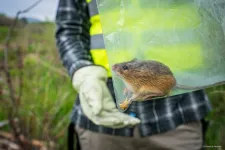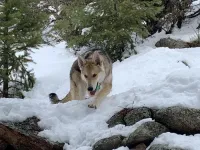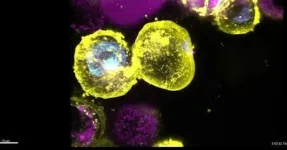(Press-News.org) San Francisco, CA - The nonprofit Revive & Restore announces a groundbreaking new initiative to biobank U.S. endangered species, in partnership with the U.S. Fish & Wildlife Service. This multi-institution collaboration is the first systematic biobanking pipeline for U.S. threatened and endangered species. The initiative will protect genetic diversity for current and future recovery efforts.
"This is about creating a legacy of America’s natural history before it is lost and provides an important resource to enhance species recovery efforts now and in the future,” said Ryan Phelan, Executive Director of Revive & Restore.
In light of the biodiversity crisis and escalating extinction risks, new solutions are urgently needed to preserve genetic diversity for America’s endangered species. Biobanking describes the intentional and indefinite preservation of living cells, tissues, and gametes. Biobanking both protects unrecoverable genetic diversity in wildlife species and expands capacity for genetic rescue strategies both today and into the future. Currently, only 14% of the 1,700+ U.S. species listed as threatened or endangered have living tissue cryopreserved.
“Biobanking gives us the chance to save irreplaceable genetic diversity,” explains Seth Willey, Deputy Assistant Regional Director at the US Fish & Wildlife Service. “If done right, it creates a marker-in-time and gives future recovery biologists options, like genetic rescue, that are only possible if we act now.”
Revive & Restore, a non-profit organization dedicated to using biotechnology to conserve and restore endangered species and ecosystems, leads the new initiative, which includes partnerships with the U.S. Fish & Wildlife Service, ViaGen Pets & Equine, U.S. Department of Agriculture, and San Diego Zoo Wildlife Alliance. The U.S. Fish & Wildlife Service has selected its first 24 U.S. endangered mammals for biobanking, including the Mexican wolf (Canis lupus baileyi), Florida bonneted bat (Eumops floridanus), and Sonoran Pronghorn (Antilocapra americana sonoriensis).
This multi-institution collaboration, which includes public-private partnerships, has established a scalable biobanking pipeline for U.S. endangered species. The pipeline includes tissue collection, the creation of living cell lines, and a national repository for cryopreservation. Cell lines provide the U.S. Fish & Wildlife Service opportunities to manage existing populations using genomic information and expand the potential for genetic rescue using advanced reproductive technologies. Samples will be collected from animals in the wild and captive breeding programs.
“We want to provide the greatest possible set of options for ensuring the continued survival of the native wildlife of the United States,” says Oliver Ryder, Ph.D., Kleberg Endowed Director of Conservation Genetics at San Diego Zoo Wildlife Alliance. “This creates a mandate for expanded efforts in biobanking living cells.”
“We are excited to be part of such a historic initiative that will provide the necessary resources for cutting edge conservation work going on today and in the future. The samples preserved during this endeavor will provide an invaluable genetic road map to enable the preservation of these endangered species,” says Dr. Shawn Walker, Vice President of Science and Technology at ViaGen Pets & Equine.
As part of the initiative, Revive & Restore has also developed resources for field biologists looking to biobank the species they work with, including peer-reviewed sample collection protocols, visual aids, and a collection of published resources from other institutions specializing in biobanking and cryopreservation. These resources can be found at the dedicated project webpage (https://reviverestore.org/projects/biobanking).
This unique collaboration is a major step forward to protecting US endangered species and creating a legacy of America’s biodiversity.
###
About Revive & Restore
Revive & Restore is the leading wildlife conservation organization integrating biotechnologies into standard conservation practice. The Sausalito, California nonprofit was formed in 2012 with the idea that 21st century biotechnology can and should be used to enhance genetic diversity, build disease resistance, and facilitate adaptation. Its mission is to enhance biodiversity through the genetic rescue of endangered and extinct species.
About ViaGen Pets & Equine
ViaGen Pets and Equine is the worldwide leader in cloning the animals we love. For over 20 years, we have been committed to the health and well-being of every animal we work with. Our team includes leading scientists, and we believe that moving the promising and exciting area of animal genetic research forward will benefit all animals.
About San Diego Zoo Wildlife Alliance
San Diego Zoo Wildlife Alliance is a nonprofit international conservation leader, committed to inspiring a passion for nature and working toward a world where all life thrives. The Alliance empowers people from around the globe to support their mission to conserve wildlife through innovation and partnerships. San Diego Zoo Wildlife Alliance supports cutting-edge conservation and brings the stories of their work back to the San Diego Zoo and San Diego Zoo Safari Park—giving millions of guests, in person and virtually, the opportunity to experience conservation in action.
END
New biobanking partnership safeguards the genetic diversity of America’s endangered species
Program offers the first systematic biobanking pipeline for U.S. threatened and endangered species
2023-10-03
ELSE PRESS RELEASES FROM THIS DATE:
Eating disorders increased during pandemic in female adolescents and adults
2023-10-03
Emergency department (ED) visits and hospital admissions for eating disorders increased during the COVID-19 pandemic in adolescents aged 10–17 years, as did ED visits among young adults and older adults, according to new research published in CMAJ (Canadian Medical Association Journal) https://www.cmaj.ca/lookup/doi/10.1503/cmaj.221318.
Using ICES data, researchers compared observed and expected rates of ED visits and hospitalizations for eating disorders before (Jan. 1, 2017, to Feb. 29, 2020) and during the pandemic (Mar. 1, 2020, to Aug. 31, 2022) in adolescents (10–17 years), young adults (18–26 years), adults (27–40 years) ...
Improved mangrove conservation could yield cash, carbon, coastal benefits
2023-10-03
A shift in the way we think about the benefits mangroves provide to coastal regions could yield significant economic and biodiversity gains and protect millions from flooding, research has revealed.
The University of Queensland-led study shows current conservation efforts typically target biodiversity protection whilst minimising conflict with economic interests, while failing to consider the huge benefits provided by ecosystems.
Alvise Dabalà, now at the University of the Azores and whose Masters project at UQ formed the basis of this study, said human activities, such as deforestation and coastal development have led to extensive ...
Brain biometrics help identify sports concussions
2023-10-03
Novel brain biometrics could help inform whether an athlete is ready to return to play following a concussion, according to new research from the University of South Australia.
Conducted in partnership with the University of California San Francisco (UCFC), researchers found that changes in micromovements of the brain – termed ‘headpulses’ – could detect the lasting impacts of a concussion.
Using a custom-designed headset* to evaluate headpulse biometrics among 101 amateur male and female Australian ...
Study uncovers reasons Americans did not get booster vaccines
2023-10-03
The paper, “Understanding low bivalent COVID-19 booster uptake among US adults,” was published in the journal Vaccine.
“Our results indicate that we have a lot more work to do in terms of educating the public and health care providers about the importance of staying up to date on COVID-19 boosters,” said first author Elizabeth Jacobs, PhD, professor of epidemiology at the Zuckerman College of Public Health, who led the research with associate professor of epidemiology Kristen Pogreba-Brown, PhD, MPH.
Nearly 40% of survey participants reported they did not get a booster shot because ...
Texas engineers land semiconductor grants through CHIPS Act-backed NSF program
2023-10-03
A pair of Cockrell School research teams are part of a massive semiconductor grant program from the National Science Foundation that includes funds from industry leaders and the federal CHIPS Act.
The projects are part of the NSF Future of Semiconductors (FuSe) program through a public-private partnership between NSF and four major tech companies: Ericsson, IBM, Intel and Samsung. FuSe aims to enable rapid progress in new semiconductor technologies and manufacturing as well as workforce development.
Altogether, the program will support 24 research and ...
Gut bacteria found in wild wolves may be key to improving domestic dogs’ health
2023-10-03
BEND, Ore. – Gut microbes found in wild wolves may be the key to alleviating a debilitating gastrointestinal condition common to domestic dogs, according to a study led by researchers at Oregon State University – Cascades.
In a paper published in Applied Microbiology, the authors report a novel strain of Paenibacillus bacteria with characteristics of a probiotic – an organism that conveys a health benefit to the host.
In this case, the benefit would be to head off canine inflammatory ...
Host genetics helps explain childhood cancer survivors’ mortality risk from second cancers
2023-10-03
(MEMPHIS, Tenn. – October 02, 2023) The population of childhood cancer survivors in the U.S. is increasing, with an overall childhood cancer survival rate greater than 85% five years after diagnosis. However, survivors can still be at increased risk of various health conditions, including second cancers. Using data from the Childhood Cancer Survivor Study (CCSS) and the St. Jude Lifetime Cohort Study (St. Jude Life), scientists at St. Jude Children’s Research Hospital have identified a genetic ...
How floods kill, long after the water has gone – global decade-long study
2023-10-03
With New York declared a state of emergency following flash flooding, there is increasing concern such events will become more common globally.
Now a study led by Monash University scientists in Australia has found that people impacted by a flooding event are at significantly increased risk of dying – including heart and lung problems – in a crucial window between three and six weeks after the event, even after the flooding has dissipated.
The study, published today in the BMJ, found that the risk of dying increased and persisted for up to 60 days (50 days for cardiovascular mortality) after a flooded day - increasing by for 2.1% for all-cause deaths, 2.6% for cardiovascular ...
USC joins LA-area stem cell institutes in forming a regenerative medicine consortium
2023-10-03
USC is partnering with seven of Los Angeles’ leading regenerative medicine institutes to form the Los Angeles and surrounding area regenerative medicine consortium (LA-RMC), with the goal of fulfilling the promise of the California Institute for Regenerative Medicine (CIRM): to develop laboratory discoveries into treatments for patients with unmet medical needs.
CIRM, the voter-created agency that provides public funding for stem cell research in California, is dedicated to advancing regenerative medicine, which uses stem cells and related approaches to treat disease and disorders. Regenerative ...
When cells go boom: study reveals inflammation-causing gene carried by millions
2023-10-03
Australian researchers at WEHI have found that a genetic change that increases the risk of inflammation, through a process described as ‘explosive’ cell death, is carried by up to 3% of the global population.
The study may explain why some people have an increased chance of developing conditions like inflammatory bowel disease or suffer more severe reactions to infections with bacteria like Salmonella.
At a glance
MLKL is a gene essential to triggering necroptotic cell death – a natural process that protects our body from infection. In some people this process can go awry and ...
LAST 30 PRESS RELEASES:
Maps can encourage home radon testing in the right settings
Exploring the link between hearing loss and cognitive decline
Machine learning tool can predict serious transplant complications months earlier
Prevalence of over-the-counter and prescription medication use in the US
US child mental health care need, unmet needs, and difficulty accessing services
Incidental rotator cuff abnormalities on magnetic resonance imaging
Sensing local fibers in pancreatic tumors, cancer cells ‘choose’ to either grow or tolerate treatment
Barriers to mental health care leave many children behind, new data cautions
Cancer and inflammation: immunologic interplay, translational advances, and clinical strategies
Bioactive polyphenolic compounds and in vitro anti-degenerative property-based pharmacological propensities of some promising germplasms of Amaranthus hypochondriacus L.
AI-powered companionship: PolyU interfaculty scholar harnesses music and empathetic speech in robots to combat loneliness
Antarctica sits above Earth’s strongest “gravity hole.” Now we know how it got that way
Haircare products made with botanicals protects strands, adds shine
Enhanced pulmonary nodule detection and classification using artificial intelligence on LIDC-IDRI data
Using NBA, study finds that pay differences among top performers can erode cooperation
Korea University, Stanford University, and IESGA launch Water Sustainability Index to combat ESG greenwashing
Molecular glue discovery: large scale instead of lucky strike
Insulin resistance predictor highlights cancer connection
Explaining next-generation solar cells
Slippery ions create a smoother path to blue energy
Magnetic resonance imaging opens the door to better treatments for underdiagnosed atypical Parkinsonisms
National poll finds gaps in community preparedness for teen cardiac emergencies
One strategy to block both drug-resistant bacteria and influenza: new broad-spectrum infection prevention approach validated
Survey: 3 in 4 skip physical therapy homework, stunting progress
College students who spend hours on social media are more likely to be lonely – national US study
Evidence behind intermittent fasting for weight loss fails to match hype
How AI tools like DeepSeek are transforming emotional and mental health care of Chinese youth
Study finds link between sugary drinks and anxiety in young people
Scientists show how to predict world’s deadly scorpion hotspots
ASU researchers to lead AAAS panel on water insecurity in the United States
[Press-News.org] New biobanking partnership safeguards the genetic diversity of America’s endangered speciesProgram offers the first systematic biobanking pipeline for U.S. threatened and endangered species







